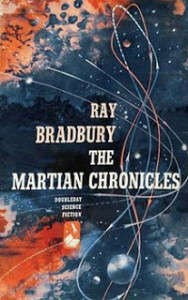 Carter Napier penned this review.
Carter Napier penned this review.
By June of 1949, Ray Bradbury was gaining recognition as one of America’s leading short story writers. He had won the O. Henry Award in 1947 and again in 1948. Bradbury’s friend Norman Corwin encouraged him to travel to New York and try to get a publishing contract with a major publisher. To that end, Bradbury scraped together enough money for a week in the big city and booked a room at the YMCA.
Unfortunately, no one was buying short story collections at that time, and Bradbury spent the entire week getting turned down by editor after editor. His last hope was Walter I. Bradbury (no relation), an editor with Doubleday. As Ray Bradbury, Don Congdon (Bradbury’s agent), and Walter Bradbury were having lunch, the author mentioned that he did not think he would ever write a novel. The editor disagreed and pointed out the series of stories about Mars the author had already written and published. He suggested that the author try to weave them together into a novel.
After Bradbury returned home to Los Angeles, he proceeded to do just that. With eleven connecting chapters and a little editing for continuity, The Martian Chronicles was born.
This is the way Bradbury tells the tale in the Fortieth Anniversary Edition of The Martian Chronicles (published by Doubleday in 1990). In later interviews, he also credits Sherwood Anderson’s Winesburg, Ohio with having a large impact on the concept after Bradbury read it in the mid-Forties. Whatever the provenance, The Martian Chronicles remains a seminal work in Bradbury’s career and in the science fiction corpus.
Any reader will immediately see that this is not really a novel, as we usually think about novels. It is choppy and episodic with little connection between chapters. Sometimes a minor character in one chapter will reappear as the main character in a later chapter, and sometimes characters refer to events that happened in an earlier chapter, but the connections remain tenuous. In a way, this structure is beneficial, since the book covers a period of 27 years and an entire planet.
The Martian Chronicles explores Bradbury’s thoughts about a frontier and the men who come to explore it, settle on it, and attempt to tame it. Through the lens of this book, we can observe some of Bradbury’s ideas about his fellow man. We find very few real heroes here.
Human history has shown time and time again the problems that can arise when alien races meet. Fundamental miscalculations and misunderstandings fuel mistrust and even outright violence. In Bradbury’s world, that reality holds true for both humans and Martians. The unwillingness on both sides to bend and adjust to the others’ way of thinking leads to tragedy and death.
In Bradbury’s view, just having the technology to make the journey to Mars is not going to make humans better people. They carry their prejudices, greed, and arrogance with them wherever they may go. The men, and later women, who go to Mars see the Red Planet in the same way that Europeans saw the New World: as land for them to claim, settle, and exploit. The existence of natives is merely a hindrance.
These future Conquistadors are interested in profit, and most fail to see the beauty of the Martian civilization that lies all around them. Their settlements are designed to reflect the Earth, their past. They are trying to adapt Mars to them, rather than themselves to Mars.
As the Earth moves closer to self-destruction, the Martian settlers finally have to face the ultimate decision: are they Earthmen or Martians? Their decision to go home, to participate in the death throes of their home world is all the answer necessary. They have never committed to Mars, except as an annex of Earth. In the end, though, one last group makes the long trek across space. Earth is no longer their home. They make the final decision, and Martians once more walk the red sand oceans.
From the opening bang of rockets taking off to the final whimper of the new Martians mourning a life now irretrievably gone, The Martian Chronicles is an open-pit mine of human psychology. As he has done throughout a long and illustrious career, Bradbury shines a pitiless and unrelenting light into the dark places that we don’t like to consider. His stories show us our faults and failings in lurid detail, as well as the immeasurable courage that so few of us possess, the courage to move beyond ourselves, beyond our humanity, to transcend our feet of clay and claim our rightful place among the gods.
Ray Bradbury’s The Martian Chronicles is a baklava of a book — rich, layered, so sweet it has to be enjoyed in small bits. This novel-that-is-not-a-novel rightfully remains a classic in the science fiction genre, and a classic example of Ray Bradbury’s genius with words. As with all of Bradbury’s work, don’t look for accurate or even consistent science. Look, instead, for tales well told, stories that seep into your mind and blood and become part of you forever.
The Martian Chronicles is required reading for any science fiction enthusiast. For everyone else, merely highly recommended.
(Avon, 1997)
